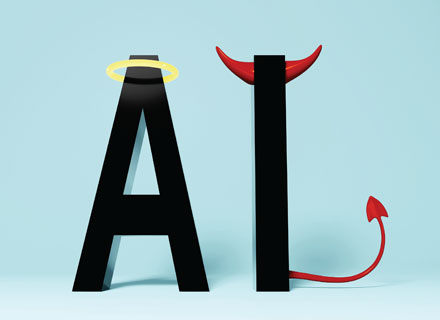Artificial intelligence (AI) is no longer just a buzzword; it’s a transformative force reshaping industries and redefining the way we work and live. While its ability to automate repetitive tasks sparks awe, it also stirs unease about its potential to displace jobs. Are we on the brink of a mass unemployment crisis, or are we witnessing the dawn of a new era of collaboration between humans and machines? The answer lies somewhere in between, offering both challenges and opportunities as we navigate this unprecedented shift.
AI’s rapid rise: A double-edged sword
AI’s rise has been both revolutionary and unsettling. By automating tasks, AI is transforming industries at an unprecedented pace. For example, chatbots like ChatGPT are redefining customer service, reducing reliance on traditional call centres. But this efficiency comes with a cost – a McKinsey report estimates that by 2030, AI could displace 400 to 800 million jobs globally.
I’ve personally experienced this AI efficiency – and frustration – when spending 20 minutes convincing a bot that my credit card wasn’t stolen. Its response? “I understand your concern.” Clearly, it didn’t.
Creativity and EQ: Humans excel where AI fumbles
Take parenting, for instance. AI can paint a beautiful picture but it can’t argue with my toddler about why broccoli is non-negotiable for dinner. That’s creativity at its finest! According to the World Economic Forum, 97 million new jobs requiring creativity and problem-solving are expected to emerge by 2025.
AI is brilliant at data analysis but falters when it comes to creativity, empathy, and nuanced decision-making. Sure, AI can generate art but can it craft a novel that leaves you sobbing or compose a song that gives you goosebumps?
Empathy remains one of AI’s glaring shortcomings. Jobs that require emotional intelligence, like therapists, teachers, and customer-facing roles, are safe – for now. Imagine pouring your heart out to an AI therapist only to hear, “I see your point.” Not quite the comfort you’d hope for.
The human touch in complex decision-making
AI can process massive datasets but managing ambiguity and making ethical decisions? That’s a human forte. Autonomous cars, for instance, still rely on humans for judgment calls in life-or-death scenarios. An AI might suggest firing Bob for inefficiency but it doesn’t know Bob is the guy who fixes the coffee machine every morning, keeping the office caffeinated and functional. That’s a value AI can’t measure.
AI: Shaping jobs of the future
Instead of outright replacing jobs, AI often enhances them, allowing humans to focus on higher-value tasks. Doctors, for example, use AI for diagnosis, freeing up time for patient care. PwC estimates AI could contribute $15.7 trillion to the global economy by 2030, creating more jobs than it eliminates. Think of AI as a microwave – great for repetitive tasks but someone still needs to cook the lasagna.
Why AI can’t fully replace humans
Despite its capabilities, AI lacks intuition, ethical judgment, and independent innovation. While AI defeated humans at chess, it didn’t invent the game in the first place. Trust, rapport, and collaboration are irreplaceable. Sales professionals, for instance, thrive on building relationships – something AI struggles with. AI might remind you of your anniversary but it won’t pick up your partner’s favourite chocolate. That’s human intuition.
And let’s not forget AI’s missteps. An AI once wrote an essay on “the benefits of eating homework” when asked for a homework excuse. If AI ruled the world, wedding toasts might become PowerPoint decks on ‘Efficient Marriage KPIs’!
A call for coexistence, not competition
Rather than competing, humans and AI should collaborate. AI can analyse billions of healthcare records but a doctor’s intuition saves lives. An IBM survey found that 87% of executives surveyed believe employees are more likely to be augmented than replaced by generative AI. Think of AI as a sous-chef – it chops the onions, and you create the masterpiece.
Ultimately, AI will reshape jobs rather than replace them entirely. It may take over routine tasks, but it will never steal our coffee breaks or replicate the camaraderie of office banter. So, will AI take over human jobs? Not entirely. The future lies in embracing this partnership—harnessing AI’s strengths while cherishing the uniquely human qualities that no machine can replicate: creativity, empathy, and intuition.


